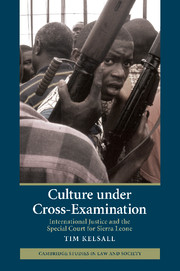Book contents
- Frontmatter
- Contents
- List of illustrations
- Preface
- 1 White man's justice? Sierra Leone and the expanding project of international law
- 2 The story of the CDF trial
- 3 An unconventional army: chains of command in a patrimonial society
- 4 Facts, metaphysics and mysticism: magical powers and the law
- 5 We cannot accept any cultural consideration: the child soldiers charge
- 6 ‘He's not very forthright’: finding the facts in a culture of secrecy
- 7 Cultural issues in the RUF, AFRC and Charles Taylor trials
- 8 Conclusion: from legal imperialism to dialogics
- References
- Index
1 - White man's justice? Sierra Leone and the expanding project of international law
Published online by Cambridge University Press: 18 January 2010
- Frontmatter
- Contents
- List of illustrations
- Preface
- 1 White man's justice? Sierra Leone and the expanding project of international law
- 2 The story of the CDF trial
- 3 An unconventional army: chains of command in a patrimonial society
- 4 Facts, metaphysics and mysticism: magical powers and the law
- 5 We cannot accept any cultural consideration: the child soldiers charge
- 6 ‘He's not very forthright’: finding the facts in a culture of secrecy
- 7 Cultural issues in the RUF, AFRC and Charles Taylor trials
- 8 Conclusion: from legal imperialism to dialogics
- References
- Index
Summary
The Special Court for Sierra Leone stands on a sprawling site in central Freetown, shielded from the rest of the country by imposing grey walls. An outer wall, ranging between five and eight feet in height, displays signs warning people that to park or even stand in the court's vicinity is forbidden; an inner one, about fifteen feet tall, is crowned by coils of razor wire. A policeman brandishing an AK-47, accompanied by other security personnel, guards the entrance from a sentry post; above it, a sand-bagged gun turret takes aim at the main road. Visitors who pass through the court's steel gate are obliged to acquire a security pass from a razor-wired concrete reception area in the shape of a pill box, then walk through a car park area and into the court's inner compound through two sliding, steel doors; vehicles, meanwhile, are subjected to bomb checks. Inside, to the left, stand the prefabricated huts of the Office of the Prosecutor, reminiscent of a military barracks or prisoner of war camp, ringed by razor wire and a six-feet high fence carrying signs that read ‘ID Cards Must be Shown at All Times’, ‘Restricted Access’, ‘Authorised Personnel Only’, ‘Visitors Must Be Escorted’. At various junctures guntoting Nigerian soldiers stand guard, wearing dark sunglasses, blue helmets and military fatigues; sometimes they conduct drills and simulate combat situations. Past the Office of the Prosecutor and up a path stands the gleaming structure of the courthouse itself, architecturally designed, apparently, to evoke an impression of the scales of justice.
- Type
- Chapter
- Information
- Culture under Cross-ExaminationInternational Justice and the Special Court for Sierra Leone, pp. 1 - 35Publisher: Cambridge University PressPrint publication year: 2009



